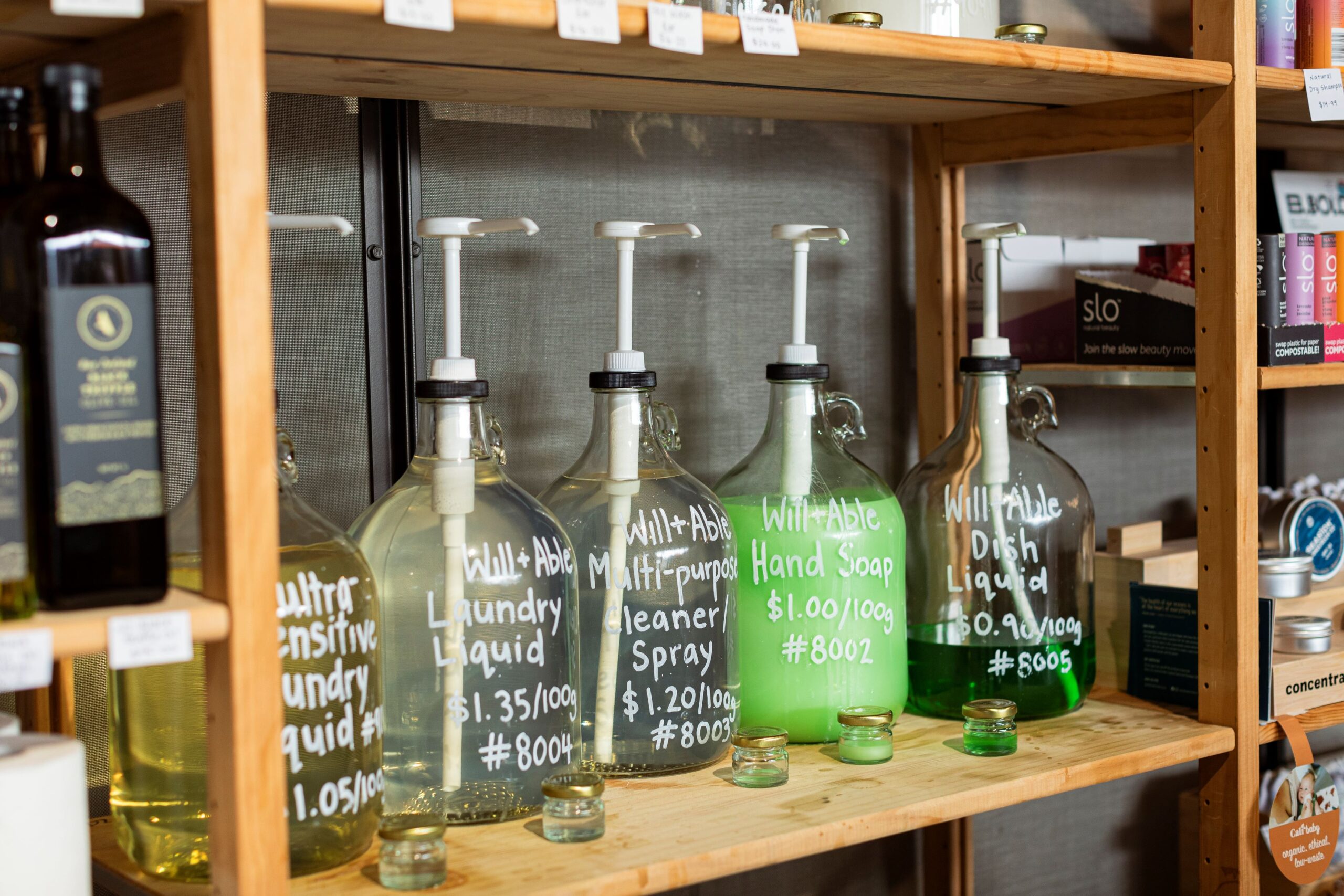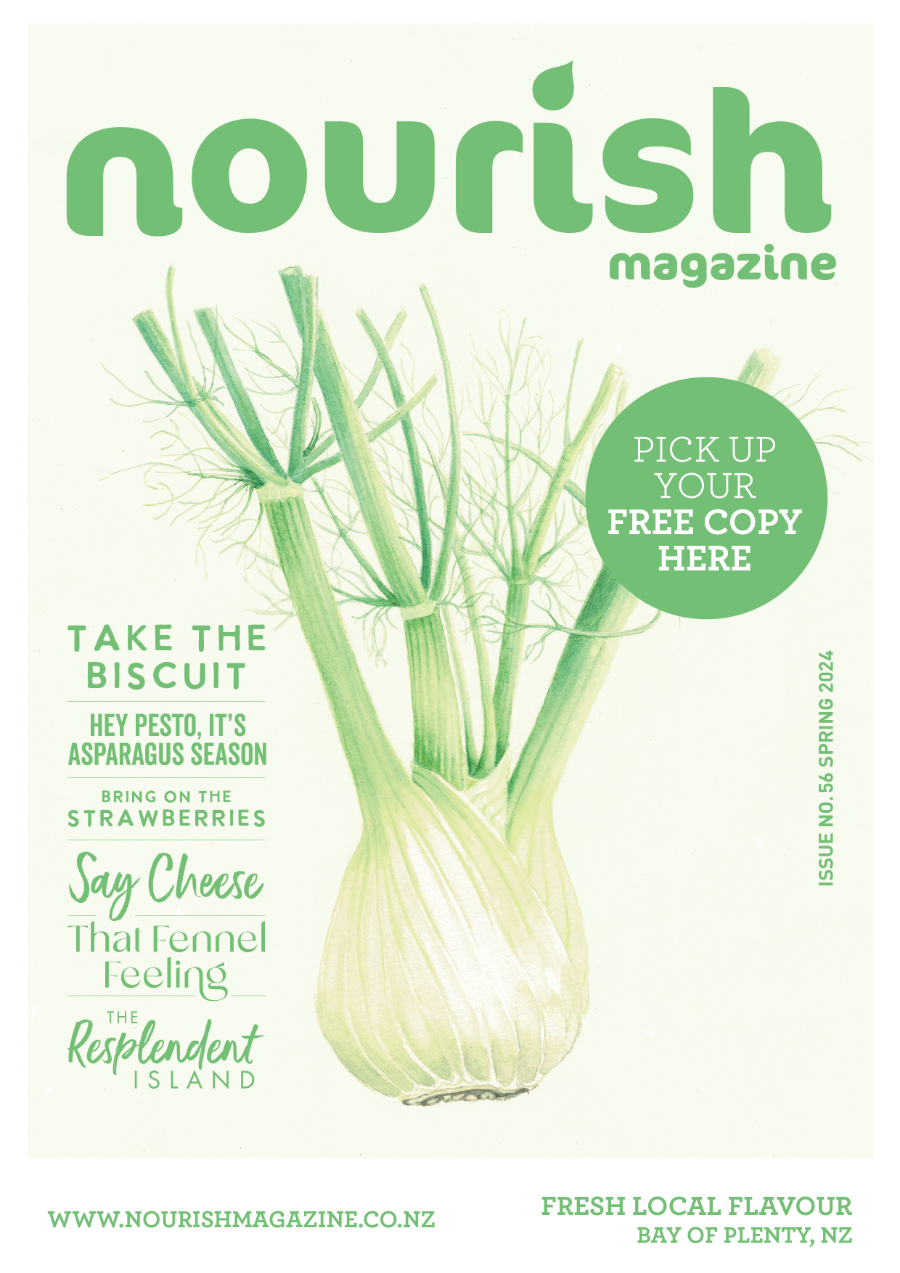
Words by Megan Lyon, Images by Ashlee DeCaires
BARE Refill Grocery Store (BARE) occupies the street frontage of the newly minted MADE urban precinct in Hamilton East, with an extensive inventory ranging from free-flow frozen dumplings to toothpaste on tap. Underpinning everything at BARE is owner Bridie McNarama’s ethos to reduce waste and packaging, and this plays out in inventive and interesting ways.
The genesis of BARE is in Bridie’s Whāingaroa|Raglan based business SWOP, which she ran with her aunt from 2020 to 2024. Bridie marvels at the town’s Xtreme Zero waste centre, which she describes as being light years ahead with waste, provided it is sorted properly, going where it needs to. This got her thinking about how she could provide that same kind of service for people, embedding robust systems which are easier in the long term. “The whole circular thing is just so much better than single use,” Bridie maintains. Other sources of inspiration were site visits to Pōneke|Wellington based companies Hopper and GoodFor Wholefoods Refillery.
When MADE general manager Chloe Wiles approached Bridie about joining the precinct, Bridie could immediately see how this opportunity would work. The larger reach of people appealed as did the prospect of Hamilton East village attracting similar minded people. “We need to go into MADE!” declared Bridie. This model means being able to shop, low or waste free, alongside with other stalls also selling essentials including vegetables, eggs, meat, milk and, of course, plant-based alternatives. She is also big on supporting locally owned businesses. “Most of the time the person behind the business is on the shop floor who really know their stuff and this gives a much nicer human interaction and experience.”

At MADE they have an eclectic customer base with people consciously shopping this way for vastly different reasons. These include saving money, reducing food waste by buying smaller amounts, obtaining niche ingredients and using just what you need. Other benefits are reducing rubbish and waste, thereby eliminating the stress of it at home, and of course the wellbeing factor through a nicer experience both shopping and using products. At BARE you can rock up without your own storage containers and either use (compostable) paper bags, help yourself to the jar library, or purchase inexpensive jars. Bridie says, “By focusing on our own wellbeing and the environment, it just feels good, and we’re happy to show people what to do and how to do it, to make it simple and easy.”
From the get-go Bridie’s primary concern has been to reduce waste, with healthy whole foods a bonus. Her focus on reducing packaging means working out who their customers are and considering solutions. One idea is to have local businesses provide a large snack jar for their staff rather than 10 individuals from the same office popping in for their post lunch pick me up. Another is to have cooking demonstrations, using whole ingredients, to share knowledge and get creative with ingredients.
Bridie worked with local company Designwell, who have a human focused design approach, for the fitout of BARE. Bridie took her learnings from SWOP, adding in design features such as bins and shelving and built-in cabinetry housing bulk supplies to replenish stock easily. Concerns such as cleanliness and hygiene are carefully considered, such as their stylish steel framing, which is easy to clean and sanitise. Fittingly, the wooden Lundia shelving, left from previous occupants Waikato Regional Council, has been repurposed, tying into other organic and textural surfaces. Selecting quality materials and incorporating them into the design means the experience is both pleasurable and fun. Bridie says her “German made gravity dispensers have a lifetime guarantee and being glass and wood will continue looking great”.

Bridie also worked with another local company, AREA Design, on brand identity, alongside Senior Designer Anna Wilkinson and Creative Director Alan Deare. The team wanted the identity to lead with a playful and soulful response to the predominantly monochromatic appearance usually adopted by wholefood suppliers. Anna reflects, “The BARE brand embraced a form of ‘hippie modernism’: organic and colourful yet held in tension with well-researched and logically organised content appealing equally to the well-informed and the passerby. The branding was inspired not just by the cultural artifacts of the 1970s (such as typography, natural/irregular forms and a sunny palette), but the genuine activism that emerged from the counterculture movement of the time. This attitude and rejection of the mainstream lethargy around packaging, capitalism and consumption is more relevant than ever.”

Bridie is constantly thinking of the overall loop, ensuring the entire experience is low waste without needless packaging, both at the supply and customer end of the business. Oats at BARE are from the South Island, which makes more sense given the way they are grown, rather than importing more expensive organic oats from overseas with a larger carbon footprint. “I mean, why would we not use those?”
After I had met with Bridie and taken my wares home, I spent a very satisfying afternoon sorting and curating my pantry by way of neatly arranged (recycled) jars. My system works, as I like having a visual reminder of what stocks we have, and while an avid recycler I’m only too happy to reduce having to deal with multiple plastic bags and containers. Thinking and acting on the notion of a continuous loop is achievable by embedding routines, and it looks and feels amazing!
Bare
Made Hamilton East
401 Grey Street, Hamilton East




